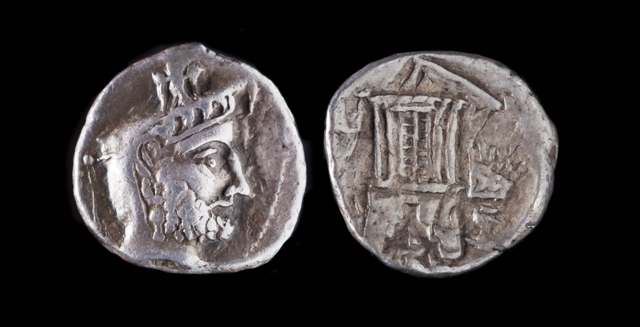Persis, Silver Drachm
Dublin Core
Title
Persis, Silver Drachm
Subject
Persis, Unknown ruler, Silver Drachm, ca. 190-164 BCE. OBVERSE: In dotted border, head of ruler right, with close-cropped beard, a circular earring, and a flat kyrbasia (Persian crown) bound with a ruler's diadem, which is tied in the back. On top of the kyrbasia stands a royal falcon in frontal view with outstretched wings.
REVERSE: Fire altar (overstruck) with double-paneled doors, podium, pilaster, and architrave, surmounted by stepped gables. Between the gables, a Farnah (king's splendor) hovering right. The altar is framed by a falcon standard on the left and a barely visible ruler in adoring position with upraised arms on the right.
REVERSE: Fire altar (overstruck) with double-paneled doors, podium, pilaster, and architrave, surmounted by stepped gables. Between the gables, a Farnah (king's splendor) hovering right. The altar is framed by a falcon standard on the left and a barely visible ruler in adoring position with upraised arms on the right.
Description
Persis, an area now in southern Iran, was the original home of the Persians. Conquered by Alexander the Great, it was controlled by the Seleucids after his death in 323 BCE. There was a period, however, when Persis was basically independent: after the battle of Magnesia in 190 BCE, which weakened Seleucid power in the region, and before occupation by the Parthian empire in 140 BCE. This coin likely comes from that time of independence.
The obverse shows the face of a ruler; though it is hard to determine which ruler. Some scholars identify him has Vadahfrad II (Autophradates II), but this identification is based on another coin with a similar image and a barely readable inscription.
The obverse of this coin shows the ruler in a Hellenistic fashion, much like the Seleucid rulers before him, though he is shown with distinctive Persian details: mainly a flat Persian crown, called a kyrbasia, adorned with the Zoroastrian royal bird, the falcon, outstretched and facing the viewer.
The reverse shows a typical Persian scene: a fire altar with a representation of the god Ahuramazda. To the left is an eagle standard and, to the right and barely distinguishable, are the arms of a ruler honoring the god. The Hallie Ford Museum of Art’s coin is peculiar because the flan has been double-struck, seemingly by accident. The outline of another fire altar in a different orientation can be seen impressed in the coin.
The obverse shows the face of a ruler; though it is hard to determine which ruler. Some scholars identify him has Vadahfrad II (Autophradates II), but this identification is based on another coin with a similar image and a barely readable inscription.
The obverse of this coin shows the ruler in a Hellenistic fashion, much like the Seleucid rulers before him, though he is shown with distinctive Persian details: mainly a flat Persian crown, called a kyrbasia, adorned with the Zoroastrian royal bird, the falcon, outstretched and facing the viewer.
The reverse shows a typical Persian scene: a fire altar with a representation of the god Ahuramazda. To the left is an eagle standard and, to the right and barely distinguishable, are the arms of a ruler honoring the god. The Hallie Ford Museum of Art’s coin is peculiar because the flan has been double-struck, seemingly by accident. The outline of another fire altar in a different orientation can be seen impressed in the coin.
Source
Gift of James and Aneta McIntyre, Hallie Ford Museum of Art, Salem, OR. 2006.010.017
Date
ca. 150 BCE
Rights
Hallie Ford Museum of Art
Format
1.690 cm
3.900 gr
3.900 gr
Type
Coin
Identifier
Persian drachm
Coverage
This item can be viewed on Hallie Ford Museum of Art's website.
Citation
“Persis, Silver Drachm,” Hallie Ford Museum of Art Exhibits, accessed February 25, 2026, https://library.willamette.edu/hfma/omeka/items/show/69.
